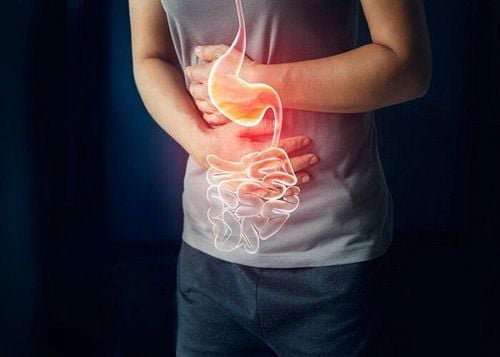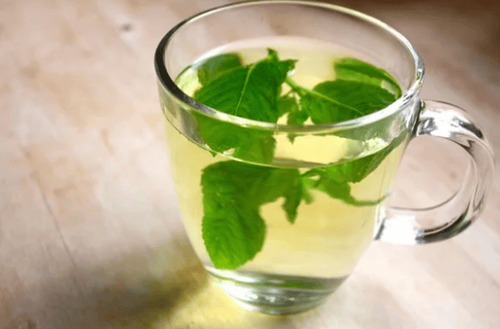Spearmint (scientific name: Mentha spicata) is a perennial plant native to Europe and Asia that is now widely cultivated across all five continents. This sweet-tasting herb is commonly used as a flavoring agent in mouthwashes, toothpaste, mints, and chewing gum.
1. Good for the digestive system
Spearmint is widely used to help alleviate digestive problems such as bloating, indigestion, nausea, and vomiting. The plant contains carvone, a compound proven to effectively inhibit muscle spasms in the digestive system. This is why spearmint is particularly effective in improving digestive disorders.
In an 8-week study involving 32 individuals with Irritable Bowel Syndrome (IBS), participants were given a combination of spearmint, lemon balm, and coriander supplements alongside loperamide (for diarrhea) or psyllium (for constipation).

The results showed that those who used spearmint-containing supplements experienced significant improvement in abdominal pain, bloating, and discomfort compared to the placebo group. Furthermore, spearmint may also reduce nausea and vomiting caused by chemotherapy treatments.
2. Antioxidant properties
Antioxidants are naturally occurring chemical compounds found primarily in plants that help protect and repair damage caused by free radicals—harmful molecules that lead to oxidative stress. Oxidative stress has been linked to various chronic diseases, including cancer, cardiovascular disease, and diabetes.
Spearmint is rich in antioxidant compounds, such as flavones, rosmarinic acid, flavanones, and menthol essential oil. Just two tablespoons (11 grams) of spearmint provide approximately 2% of the recommended daily intake (RDI) for vitamin C, another powerful antioxidant.
Researchers have also discovered that extracts from spearmint can inhibit the oxidation of fats in meat, showing effectiveness comparable to the synthetic antioxidant BHT (butylated hydroxytoluene).
3. Balance female hormones
For women experiencing hormonal imbalances, spearmint tea may offer supportive benefits. Recent studies suggest that drinking two cups of spearmint tea daily can help reduce the male hormone testosterone while increasing female hormones essential for ovulation, such as luteinizing hormone (LH), follicle-stimulating hormone (FSH), and estradiol. This makes it particularly beneficial for women suffering from polycystic ovary syndrome (PCOS).

4. Reducing hirsutism in women
Spearmint tea has shown promise in alleviating hirsutism, a condition marked by excessive hair growth on the face, chest, and abdomen in women. This herbal remedy is widely used in the Middle East to address abnormal facial hair growth.
High levels of male androgens are closely associated with excessive hair growth in women. In a five-day study, 12 women with PCOS and 9 women with unexplained facial hair growth were given two cups of spearmint tea per day during the follicular phase of their menstrual cycles. Although the study was too short to assess long-term effects on facial hair, results showed a reduction in testosterone levels.

In another 30-day study involving 41 women with PCOS, participants who consumed two cups of spearmint tea daily reported a noticeable reduction in facial hair density. However, longer studies are needed to confirm its full effectiveness in reducing excessive hair growth.
5. Enhancing memory
There is some evidence suggesting that spearmint may help improve memory.
Earlier studies on humans found that chewing mint-flavored gum could enhance memory. In a more recent study, older adults with memory impairment who consumed approximately 900 mg of spearmint extract daily demonstrated a 15% improvement in working memory capabilities.
While evidence regarding the memory-enhancing benefits of spearmint is still limited, these findings offer hope, particularly for older individuals seeking to improve cognitive function.
6. Fighting bacterial infections
Mint is commonly used in the production of toothpaste and chewing gum. Beyond its ability to freshen breath, it has antibacterial properties and can eliminate bacteria responsible for bad breath.
Additionally, spearmint has been shown to combat foodborne pathogens, including E. coli and Listeria.

7. Lowering blood sugar levels
Spearmint tea may help reduce high blood sugar levels in individuals with diabetes. In a study, mice were given spearmint extract at a dose equivalent to 9 mg per pound (20 mg/kg) of body weight daily. The results indicated that while healthy mice remained unaffected, diabetic mice experienced a significant reduction in blood sugar levels.
8. Reducing stress
Spearmint tea promotes relaxation and helps reduce stress. In fact, this tea is commonly used in South American countries to treat stress and insomnia.
Additionally, the leaves of this plant contain spearmint essential oil, which exerts relaxing and sedative effects on the body. The relaxation-inducing and stress-reducing mechanism of spearmint involves its interaction with GABA receptors in the brain, a neurotransmitter that helps decrease neural activity.

9. Alleviating joint pain
Spearmint may help reduce joint pain symptoms caused by arthritis. Several studies on both animals and humans have concluded that spearmint essential oil is effective in relieving pain.
For individuals with knee arthritis, drinking spearmint tea twice a day helps reduce joint stiffness and improves physical function.
10. Lowering blood pressure
Spearmint has been shown to effectively reduce high blood pressure levels. This herb contains carvone, a compound that acts similarly to calcium channel blockers used to treat hypertension. Moreover, animal studies suggest that carvone is over 100 times more potent than verapamil (a common blood pressure medication) in reducing vascular spasms.

11. Easily integrating into your daily diet
Spearmint can be conveniently incorporated into your daily diet. Nowadays, spearmint is commonly available in the form of tea bags or fresh tea leaves. Additionally, you can grow spearmint at home to ensure hygiene and safety.
When preparing spearmint tea at home, follow these steps:
- Boil two cups of water (473 ml).
- Tear a handful of spearmint leaves and add them to the boiling water.
- Steep the tea for 5 minutes.
- Strain the tea and enjoy.
This tea is caffeine- and calorie-free, making it a natural beverage that you can enjoy at any time of the day. However, note that using undiluted spearmint oil may cause irritation to the skin and mucous membranes.
Vinmec International Hospital, with its modern facilities, advanced medical equipment, and a team of experienced specialists and doctors, provides patients with reliable medical care and treatment.
To arrange an appointment, please call HOTLINE or make your reservation directly HERE. You may also download the MyVinmec app to schedule appointments faster and manage your reservations more conveniently.
Reference source: healthline.com
SEE MORE
Effective treatment of neck and shoulder pain by impacting the spine Precious medicine from the banana tree Make a simple cough medicine in a folk way
To arrange an appointment, please call HOTLINE or make your reservation directly HERE. You may also download the MyVinmec app to schedule appointments faster and manage your reservations more conveniently.


